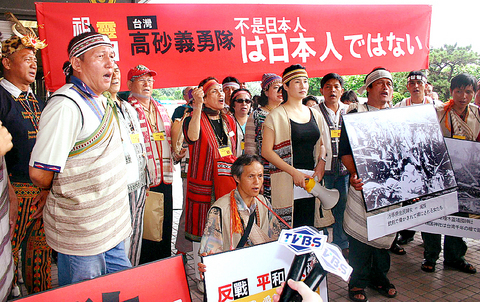More than 50 people representing Taiwan's indigenous tribes arrived in Japan yesterday to demand that the names of their ancestors forced to fight in World War II be removed from a controversial war memorial.
The protesters, many in traditional clothes, held a ceremony outside an airport lobby before they boarded their planes to summon the spirits of their ancestors killed in the war.
Representing nine tribes, they plan to protest from today outside Yasukuni shrine, dedicated to 2.5 million war dead, including 14 convicted Japanese war criminals.

PHOTO: AFP
Japanese authorities have, however, warned them via Taiwan's de facto embassy that they would be barred from visiting the shrine.
The group also plans to travel to Osaka where a verdict is expected on June 17 in a court case demanding the removal of the names.
Some 28,000 Taiwanese names -- about 10,000 of them of indigenous Taiwanese forced to join the Japanese military -- are listed at the shrine.
The soldiers listed were pressed into military service when Taiwan was a Japanese colony from 1895 to 1945.
"What we want is simple: that the names of our sacrificed ancestors be removed from the Yasukuni shrine," Chang Chun-chieh (張俊傑), an aide to Legislator May Chin (高金素梅) who is heading the group, said.
"The names of the ancestors should not be listed together with some 1,100 Japanese soldiers who died while invading [Taiwan]," Chang said.
Another protester, Tu Shui-chiu, told reporters: "I had dreamed of a group of ancestors last night. They are anxiously waiting for our arrival."
May Chin said last week her office had received "countless phone calls" warning her group against making the trip.
She said she had also been sent an anonymous postcard which threatened in Mandarin: "I will wait for you in Japan on June 13 so that you can come to Japan and return lifeless to Taiwan."
Undaunted, she said: "We'll protest in a peaceful manner as scheduled."

CHAOS: Iranians took to the streets playing celebratory music after reports of Khamenei’s death on Saturday, while mourners also gathered in Tehran yesterday Iranian Supreme Leader Ayatollah Ali Khamenei was killed in a major attack on Iran launched by Israel and the US, throwing the future of the Islamic republic into doubt and raising the risk of regional instability. Iranian state television and the state-run IRNA news agency announced the 86-year-old’s death early yesterday. US President Donald Trump said it gave Iranians their “greatest chance” to “take back” their country. The announcements came after a joint US and Israeli aerial bombardment that targeted Iranian military and governmental sites. Trump said the “heavy and pinpoint bombing” would continue through the week or as long

TRUST: The KMT said it respected the US’ timing and considerations, and hoped it would continue to honor its commitments to helping Taiwan bolster its defenses and deterrence US President Donald Trump is delaying a multibillion-dollar arms sale to Taiwan to ensure his visit to Beijing is successful, a New York Times report said. The weapons sales package has stalled in the US Department of State, the report said, citing US officials it did not identify. The White House has told agencies not to push forward ahead of Trump’s meeting with Chinese President Xi Jinping (習近平), it said. The two last month held a phone call to discuss trade and geopolitical flashpoints ahead of the summit. Xi raised the Taiwan issue and urged the US to handle arms sales to

State-run CPC Corp, Taiwan (CPC, 台灣中油) yesterday said that it had confirmed on Saturday night with its liquefied natural gas (LNG) and crude oil suppliers that shipments are proceeding as scheduled and that domestic supplies remain unaffected. The CPC yesterday announced the gasoline and diesel prices will rise by NT$0.2 and NT$0.4 per liter, respectively, starting Monday, citing Middle East tensions and blizzards in the eastern United States. CPC also iterated it has been reducing the proportion of crude oil imports from the Middle East and diversifying its supply sources in the past few years in response to geopolitical risks, expanding

An Emirates flight from Dubai arrived at Taiwan Taoyuan International Airport yesterday afternoon, the first service of the airline since the US and Israel launched strikes against Iran on Saturday. Flight EK366 took off from the United Arab Emirates (UAE) at 3:51am yesterday and landed at 4:02pm before taxiing to the airport’s D6 gate at Terminal 2 at 4:08pm, data from the airport and FlightAware, a global flight tracking site, showed. Of the 501 passengers on the flight, 275 were Taiwanese, including 96 group tour travelers, the data showed. Tourism Administration Deputy Director-General Huang He-ting (黃荷婷) greeted Taiwanese passengers at the airport and